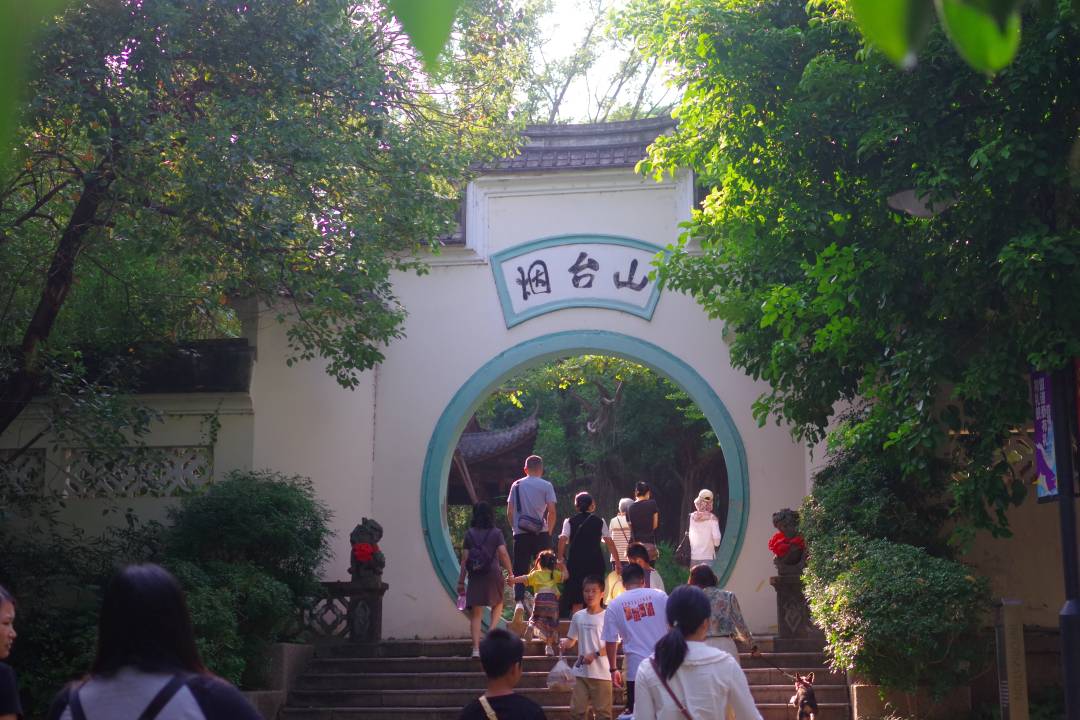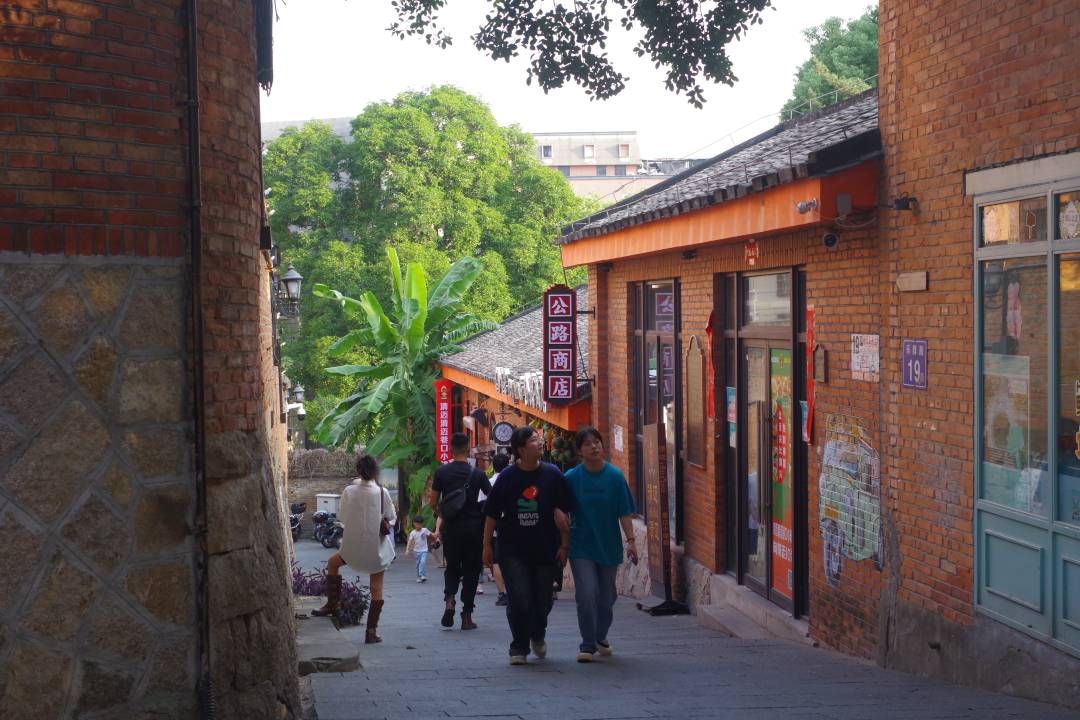Fuzhou Yantaishan Historic District
Walking up the winding path on Yantai Mountain feels like opening a thick, weighty book filled with stories.
Over a century ago, contemporary fashions and traditional Chinese homes converged here, turning Yantai Mountain into a cultural hotspot rich in Fuzhou’s history. Today, the blend of Chinese and Western cultures has taken root here, giving the area its unique “Yantai Mountain charm.”
The shady trees and ancient buildings of Yantai Mountain seem to whisper with history and the echoes of time
For Fuzhou locals, the memory of old Cangshan lives on in every corner of Cangqian.
Ye Shengtao once wrote in The Hakka Language: “Cangqian Mountain is like a garden, where every road, every cluster of flowers, every house, even every carriage driver, holds a touch of poetry.” Nestled along the scenic Cangqian Meiwu Road, Yantai Mountain was once known as “Cangqian Mountain.”
This Meiwu Road is an ancient path of Cangshan, named for its abundant plum blossom trees. Ming scholar Xu Tong once wrote, “Ten miles of blossoms form a marketplace, and a thousand plum blossom trees create a forest.” Even today, as winter gives way to spring, the road draws a steady stream of visitors eager to admire the plum blossoms.
At the foot of Yantai Mountain, Yantaishan Park fills the cool autumn days with a burst of greenery. Beneath shady trees and beside graceful pavilions, visitors are welcomed by timeless scenery and a peaceful atmosphere shaped by the passage of time.

Yantaishan Park
People often say that architecture is living history, carrying the memories of a city forward. Walking into Yantai Mountain is like entering the “Museum of World Architecture” which holds over a hundred years of stories. Nestled along the foothills are almost a hundred Western-style structures—consulates, trading companies, villas—dotting the landscape like stars, each distinct in style and character.
As one of China’s earliest treaty ports, Fuzhou held a special political status and strategic location, making it a key hub for Sino-Western cultural exchange and foreign trade in modern times. Yantai Mountain’s history is vividly reflected in its historic buildings—the Lequn Building, a former gathering place for consuls and merchants from around the world; the former residence of the Minhai Customs Commissioner during the Qing and Republican periods, originally the site of the British trading firm Holliday Wise & Co.; the Stone Church, built in the tenth year of the Xianfeng reign, famed for its distinctive English countryside chapel design; and the American and French consulates, which showcase Western classical architectural styles.
In his diaries, French playwright Paul Claudel often called Fuzhou “home.” To him, it was an ideal home “bathed in the hues of roses and honey”—a phrase now etched into the stone wall outside the French consulate. Even today, on clear evenings, you can still catch the sunset light streaming through the glass windows.

Yantaishan Ancient Street
Yantai Mountain was once the starting point for many overseas Chinese who ventured abroad to build their future, as well as countless famous figures and pioneers. Notable figures such as Ye Shengtao, Lin Huiyin, and Sun Yat-sen were captivated by the early traces of the Western lifestyle that first appeared here. They captured the charm and cultural depth of Yantai Mountain through their writings and works, leaving behind a literary legacy that still resonates today.
Perched atop Yantai Mountain, Fuzhou Senior High School boasts a history of over 130 years. To this day, it continues to nurture generations of talent. The school has produced 13 academicians of the Chinese Academy of Sciences and the Chinese Academy of Engineering, including Hou Debang, Chen Jingrun, and Shen Yuan, as well as influential political and educational figures such as Lin Sen and Chen Daisun. It remains one of the few enduring strongholds of traditional scholarship in today’s fast-changing world.
Stroll through the trendy street and experience the blend of heritage and modern flair
Along Tingxia Road by the Minjiang River, a commercial pedestrian street bustles with crowds and vibrant energy every day.
In 2022, the Comprehensive Improvement Plan for the Yantaishan District in Cangshan was issued, breathing new life into the area. A variety of Chinese tea houses, Western-style courtyards, and flavorful eateries settled along the streets. Since then, the revitalized historic buildings have seamlessly blended with vibrant modern elements, making the district a top hotspot for young people to gather and snap photos.

Shops along the Street
After a long day, people often meet up with a few friends to relax and unwind at Yantai Mountain. Strolling here feels like wandering through a charming foreign street. With a pot of fine wine, a cup of coffee, a delicious meal, or some tea in hand, they settle by the window, enjoying the gentle breeze and casual conversation. The distant whistles of passing boats drift through the air as they gaze out at the river traffic, savoring these peaceful moments of comfort and calm.
In the evening, around the corners of Yantaishan District, you can often catch street performances—sometimes romantic, sometimes vibrant and lively. The soulful singing and rhythmic beats awaken the city’s artistic spirit, while the colorful lights and music combine to wash away the day’s fatigue.
For those who have lived here many years, these changes strike a deep chord. Decades ago, young people here would watch movies at Cangshan Theater, relax in Yantaishan Park, and enjoy meals at the Kuaihuolin Western Restaurant. Today, Fuzhou’s young people have their own “Yantaishan must-visit route”—visiting exhibitions at the former U.S. consulate, taking photos by the ginkgo tree in front of the Stone Church, sipping tea and reading at popular teahouses, enjoying handcrafted milk tea or coffee from local shops, and savoring Yantaishan-themed popsicles from the “Rongshuxia” shop.
Strolling down the shady paths of Yantai Mountain, you can truly feel the new vibrancy breathed into the historic buildings, alongside the fresh vitality flowing through the new ones. Yantai Mountain is not just a place of memories and the present moment—it’s also a hopeful vision of what lies ahead.